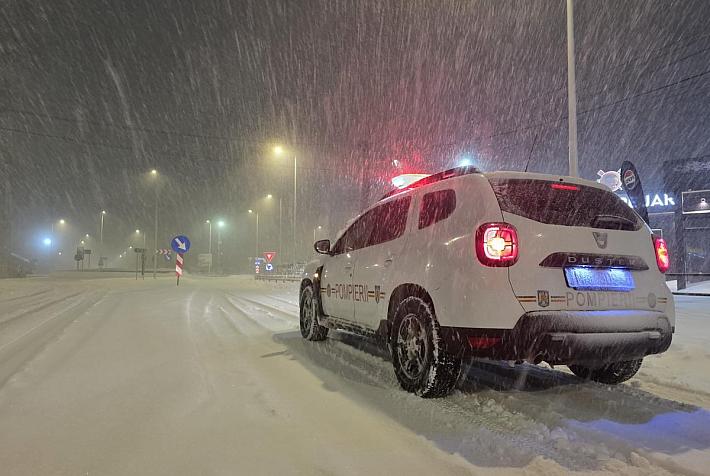Guest post: Nobody is coming to save journalism. Ten thoughts about the state of media in Romania

Guest writer Cristian Lupsa, who founded and edited for 13 years one of the most appreciated magazines in Romania – DoR, shares his view on the state of Romanian media after the recent protest of the journalists working at two newspapers owned by the Swiss group Ringier in Romania.
Last fall, after we announced DoR was shutting down, I received an email from an executive at powerful sports betting company. He was graciously offering to help us keep the lights on – like they had helped other publications. I said thank you, but no, reminded him that our shutting down wasn’t just about money, but also mentioned we never accepted money from his industry. (And wouldn’t).
I felt I offended him – he was, after all, only trying to help, and here was I, being all righteous.
Same thing happened with a tobacco company rep. I gave the same answer, they likely reacted in a similar way: what a bunch of snobs we were.
They were right.
Over the years, we took money from banks (most of them), supermarket chains, energy companies, oil companies, soft drink makers, alcohol makers, car makers, large retails chains, private healthcare services and the list goes on. We also received money from tech giants, embassies, foreign foundations. Arguably, many players in all these spaces have done plenty of wrong: from using their outsized power to lobby the state for favors, to passing the buck to consumers when the times were bad, to contributing to the ailments of the planet.
So why not take money from sports betting? Or tobacco? Or pharma? Or the government? Especially since when talking about these industries we’re not talking about buying a page for 1.000 euros, but arguably we could strike deals worth 10-20, maybe even 50.000 euros. And that helps do ambitious work, no?
The answer, I’m afraid, is terribly unsatisfactory. When we build a media business and decide how we make money, we all draw somewhat arbitrary lines. Those were ours.
*
This week, Romanian media was rocked by scandal: the editor-in-chief of Gazeta Sporturilor, Romania’s largest sports paper, was sacked by the owners – Swiss conglomerate Ringier. The editor and his colleagues at Libertatea (Ringier’s flagship property) said the firing had to do with the newsroom opposing the commercial side’s desire to show leniency to the sports betting industry, going as far as having stories approved, or sharing information before publication.
The journalists protested, wrote an open letter, and continued – especially in Libertatea – to garner support for editorial independence over commercial interests. They also were adamant that they would not leave – they felt an obligation to the public to continue, almost daring the parent company to fire them, too.
For their part, Ringier expressed continued support for editorial independence, and said their reasons for firing the EIC of GSP was a difference in vision and strategy.
*
Seeing the staff of GSP and Libertatea stand up for editorial independence made me proud to be a journalist in Romania. It’s one thing to take money from a company that wants to advertise on your site and in your pages, and it’s a different thing for that company to then demand editorial favors or leniency. I’m not saying it doesn’t happen (the rest of this letter is largely about how it does) – I’m saying it’s up to the editorial side to stand up and risk their jobs and livelihoods – which were pretty precarious anyway – in the process.
I’m glad my journalism students can see this.
I’m glad the public – who understand too little about how we work – can see this.
And I’m glad young people in the marketing and sales departments of companies and agencies get to see this, too – when you buy advertising space, you’re buying advertising space. You are not buying the journalist. Because, ideally, a journalist isn’t working for you – they are working for the public.
*
More than 15 years ago I was working for a large publisher of magazines here in Bucharest (they have since folded, of course). I tried to live then, as I still do, by the 10 elements of journalism I learned from Bill Kovach and Tom Rosenstiel, who I worked for. Number two says: Journalism’s first loyalty is to citizens. And number nine says: Its practitioners must be allowed to exercise their personal conscience.
I said these things at one point to both my boss and the guy running the sales department: I don’t work for your company, I work for the reader, and will quit if my personal values are threatened. There might have a tad of arrogance in there, but I also naively believe we all agreed on this.
The boss took me aside afterwards and told me: don’t say this again with others present.
*
What’s happening with GSP and Libertatea isn’t new. We’ve been decimating our newsrooms, our principles, and our values for as long I’ve done this job in Romania. What they are doing might be among the last stands from larger legacy media in favor of editorial independence. What they are doing is what others in their position should have done 5-10-15 years ago.
Nobody came to save journalism then, and nobody will come to save journalism now.
Because, as much as we hate to admit it, journalism is as much at fault for the shithole it’s in right now, as the commercial or political interests it skewers.
Plenty of ill-meaning forces have been wishing for years that we went away.
And we’ve helped make the process easier.
*
Here’s ten things to think about that both determine or influence the reality we’re in, but also open paths for innovation, creativity and new solutions, if we look closely enough.
1. Journalism hates change. The advertising model of media has been on life support since the last major financial crisis that kicked off in 2008. The number of newspapers and magazines that shut down in its wake in Romania could fill a graveyard. And yet, we didn’t want to seek alternatives, and doubled down, opening the floodgates to advertising disguised as content. “The reader shouldn’t see the name or logo of the company on ads or ad content”, agencies and companies said among other things, and we complied. (Putting the genie back in the bottle is what we’re seeing today with people hoping content creators will be more transparent with who’s paying them).
When we started DoR in 2009 everyone – inside and outside the profession – wanted to talk us out of it, especially out of our idea that reader revenue matters, too. You’ll make no money, they said. Reader revenue is nothing, they said.
But advertising wasn’t and isn’t the only model. Reader revenue matters. You can be strategic and creative, and have a diversified revenue portfolio. From 2017-2019 we were close to (and even surpassed) 1 million euros in revenue, and the pie chart was almost evenly split between advertising, magazine sales & membership, grants, and events. (Today, Recorder brings in more than 1 million euros from reader revenue alone.)
Of course, a large publisher with tens of employees needs a few times that amount, but still, virtually none of them tried anything bold in terms of business models or strategy in the past decade. (Thus, many died without a fight, others are alive but irrelevant).
Independent journalism in Romania exists and thrives largely because legacy media still lives in the past. (And its ethical struggles are real and difficult, as Adrian writes).
2. Mass is dead. Some in my generation of journalists still dream of large audiences, huge publics, millions, immense reach. It talks about public interest and public responsibility and expects the populace to be tuned in to the latest political or social or economic development. But mass-media is dead. Yes, you can still reach millions and have a hit, but the average size of audiences is dwindling – TV is the best place to see this. Digital media tricked us for a while, too: we chased clicks because they equaled cash (there we went, betting on advertising again), we spent money on SEO, and we let Facebook woo us when they said they’ll bring our stories to millions of people. And they did. Until they stopped. Facebook is not showing news anymore, they have deprioritized links, and shattered their in-house journalism team. Twitter is doing the same. If you look around the world in 2023, even some of the kingmakers of the digital era are dying – BuzzFeed, Vice etc.
3. Platforms couldn’t care less. It’s not worth saying much more except this: a few years back, after attending some invite-only events put together by Facebook I realized an open secret. Facebook was paying good money to publishers to try whatever they wanted them to try. Remember Facebook video? Especially live streaming? Well, plenty of (Western) publishers got money to try that. They didn’t just adapt to “trends”: they were paid to try and start them. I rarely felt more like an idiot that I did back then. Of course they paid British and German and French publishers; they weren’t going to be paying Romanians, Slovaks, or Bulgarians. Today, platforms realize journalism isn’t useful to them; it’s actually a nuisance when it reports on their dealings. So they’ll turn off our reach. (Apply similar thinking to AI).
4. Our product sucks. This is the elephant in the room. Our average journalism was bad twenty years ago, and it’s worse today. Yes, our award-winning journalism has become stellar, and it can compete with the best out there, but those are a few pieces and projects a year. The majority of what we produce is mediocre at best. Some of it is the reporting or writing/editing/producing. But a large part of it is the carelessness of the packaging, the irrelevance to people’s needs, and the lack of strategic planning.
Every legacy outlet in Romania today publishes more or less the same news stories every day. Little of it helps me with my day to day life: it doesn’t teach me or surprise me, it rarely explains, and doesn’t care much for me becoming a better person. Curated forms – like Bianca’s newsletters, or Recorder’s podcast, or Gen, știri’s feed – are working less because of the content (which is largely the same), but because the product and the experience are better.
Speaking of product: Libertatea, for example, might do good journalism, but it’s appalling in terms of user experience – there are banners and other advertising gimmicks coming at me from all sides, and the text is broken up and segmented as if they’re not trusting the reader can follow a story.
When the product influences the experience, I tend to stay away from it. We don’t pay for bad products, and we don’t really care if the maker says: “Don’t mind the packaging, it’s good for you”. (This applies to other cultural products – books! –, events, and many civil society initiatives).
5. The pipeline is broken. What many of the above show is the dearth of good management. Or, I would argue, it shows how the generation of media managers of the 1990s and 2000s set us up for failure. I’m talking here about business folks that respect and understand journalism, but also about all the roles that have been common for years now in newsrooms abroad, but are unicorns over here: revenue, development, product, audience etc.
We don’t have enough leaders in journalism. We don’t have product owners. We don’t have chief revenue officers. We don’t have audience or community managers. We have some people that hold those titles, but they’re either too junior so it’ll take a while for them to be effective, or they’re just using them as steppingstones to an editorial role.
Ten years ago I complained it’s hard to find good reporters and editors. And yes, we still don’t have editors (no, not the person proofing the story, and changing the headline – that one should be called a copy editor). But I see the talent in the twenty-somethings I work with. We can build a new generation of reporters, writers, video journalists etc. But unless we have people that can manage newsrooms and make them sustainable, the new editorial talent won’t have a place to practice in.
6. We’re the power structure. We like saying we serve the public, but we also like the privilege of our roles. This applies less to the reporters in the field, and more to their managers or owners, many of whom are not making a living from their journalism, but from their fame. Most working journalists are poorly paid, and even when they start at a good rate, their salaries will soon stop growing.
This establishment view is also often visible in the content. As Pulitzer-prize winner Wes Lowery wrote: “Newsrooms claimed to value justice while truly coveting order”. Romania remains a largely conservative country. Much of the media echoes that in its framing of issues such as climate change, poverty, gender rights, racial equality, addiction and more.
7. We’re simultaneously powerless. Especially when dealing with commercial funding, journalism’s troubles over the past decades have made it even more vulnerable to the whims of advertisers. Late last year, someone in PR asked me for an interview – it never ran. The starting question was something like: can PR and ad agencies save good content? My answer was “no”. I also sent her a list of reasons from our 13-year publishing experiment. Here’s a few: their contracts have ridiculous payments deadlines – up to 90 days after a service is delivered. Most don’t pay on time. Many make you beg for the money they are contractually obligated to give you. One healthcare services provider once said we shouldn’t bug them so often for payment, as it’s “a small sum”. For them maybe, for an independent publisher it was our salaries for a month.
I wish I could say it was the exception, but it’s rather the norm. One reason our relationships with agencies and companies is bad is because they are unprofessional, bullies, they sometimes look for kickbacks (because we allowed them), and they only pretend to care.
And it’s fine – they’re beholden to whomever pays their salaries. I don’t need them to pretend they like us. But they should at least be willing and able to follow a contract, right?
(Raluca has written more on this from her long career in advertising.)
8. Newsrooms are bad for you. As I wrote last week – we journalists struggle with burnout, anxiety, depression. We have inherited male-dominated toxic cultures, where competitive cynics ruled. (Some of them are still around.) We lack clarity, empathy, we disregard most of what’s not related to a story – from newsroom culture, to processes, to strategy. What is the most difficult reality to face, at least it was from me, is that you can never ever fix all of them.
But we should always be aiming to make our workplaces better, more flexible, more inclusive, and more generative. We’ll fail tons along the way. But it’s not an excuse to not try. The fact that many good journalists have picked freelancing should worry us.
9. We make rules that we break. There is arguably a rule to doing this work: publish verified information and be transparent about how you got it and checked it. But since we’re a grandstanding profession – you should hear us talking about freedom of expression, saving democracy and the likes –, we also love making pronouncements as if they are commandments.
We never bow to commercial pressures. Except when we do.
Journalists should never collaborate with their colleagues in business. Except when they do.
We should never show stories to our sources. Except when we do.
We never pick sides. Except when we do.
Being humble is not something we are great at. It wouldn’t hurt us to go a little easier on playing this righteous defender part. We are a flawed bunch because that’s what being human is about. Let’s stop pretending we live by Kantian imperatives when we don’t. It might even make us more trustworthy.
10. All hope is never lost. I was and always will remain an optimist. This profession has given me a lot, and I believe we still have a role to play. But we’re not victims. We’ve participated in our moments of glory, and we’ve been complicit to the downfall. If we make it out, it won’t be in spite of all the challenges above, but because of them.
It’ll be because we’ve looked in the mirror we’re holding up to society and have seen ourselves just as flawed. And we’ll find courage in that. And maybe creativity, and a desire to collaborate.
Sure, nobody is coming to save journalism.
But journalism still has plenty it can do to save itself.
by Cristian Lupsa, journalist, storyteller, editor, teacher, co-founder and editor of Decat o Revista - DoR (2009-2022)
*This article was first published in Cristian Lupsa's newsletter - Draft Four.
(Photo source: 8583068 © Janaka Dharmasena | Dreamstime.com)












